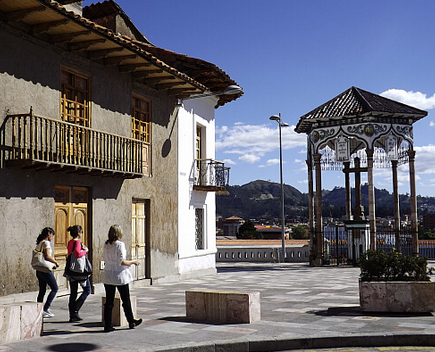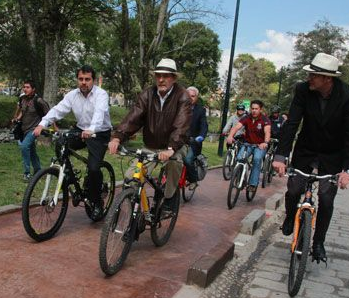When you move to Latin America, leave your ‘north of the border’ attitudes behind
By Chuck Bolotin
When in my early twenties, after crossing the border near San Diego with my friends and driving south in Mexico, I noticed lots of houses in which the construction had begun but was not finished.
 “How stupid”, I thought, viewing what I believed to be evidence of bad planning on a large scale by lots of silly people. “What a waste! Why get started if you don’t finish?” (I may even have harrumphed, but I don’t remember.)
“How stupid”, I thought, viewing what I believed to be evidence of bad planning on a large scale by lots of silly people. “What a waste! Why get started if you don’t finish?” (I may even have harrumphed, but I don’t remember.)
I didn’t think about it much more until, close to the present time, when I was interviewing an expat for our site, Best Places In The World To Retire. We were talking about how, in Mexico and Central American countries in general, such as Panama, Belize and Nicaragua, there is little or no financing available to average people, and certainly, very little financing for home purchases or construction.

The culture is different and the pace is slower south of the border. Get used to it.
“That’s why you see so many houses in varying stages of construction,” he said. “They only build when the family has saved enough money to buy the building materials in cash. They may just build half a room one year, and if it’s a bad year, skip the next year entirely, so the partially-built home just sits. It’s only after many years of cycles of saving and building (usually with the labor supplied by themselves, family and friends), that they eventually have a complete house, but it can take a very long time.”
Upon hearing this explanation and thinking back to my previously ill-informed conclusions, not only did I feel foolish, but worse… I felt like a jerk. There I was, in my early twenties, judging very harshly these hard-working, thrifty, industrious people who were striving to make a better life for themselves, their families and later generations, who couldn’t get the financing I figured everyone could get. It never occurred to me that conditions were different in Mexico than in the U.S., and therefore, just like in the U.S., that it would make no sense not to finish your house in Mexico… with that construction loan you certainly could easily get from the bank.
One of the contributors to our site, By Edington, lives in Colombia and brought to my attention this quote by Mark Twain:

Out for a bike ride? Why hurry?
“Travel is fatal to prejudice, bigotry, and narrow-mindedness. Broad, wholesome, charitable views of men and things cannot be acquired by vegetating in one little corner of the earth all one’s lifetime.”
Of course, Mark Twain was right and, desiring “broad, wholesome, charitable views of men and things,” my wife and I decided to travel and perhaps to move abroad. Here is some of what we found.
In general, rational people behave the same way, if they’re in the same situation. But, we’re not all in the same situation, as was pointed out to me in the “financing availability” example.
Here’s another example.
The “Mañana Culture” is when South of the Border (SOTB) people aren’t as punctual as we North of the Border (NOTB) types, and more so, don’t get too upset if things don’t go according to plan. NOTB, we tend to point to this difference as evidence of our superiority.
Well, it’s not. The Mañana Culture Culture makes perfect sense if you live in a place where things don’t usually go perfectly. We can leave aside for this article why things are less likely to go perfectly SOTB, and just point out that many times the roads aren’t maintained as well as NOTB, there is more arbitrariness in the rule of law, the electricity will go out more often, etc. If, when these things happen, you get angry, you would be angry pretty much all the time and even worse, your anger would do nothing to fix the problem. A better SOTB strategy would be to shrug it off, concentrate on the good things in your life that you have more control over, such as your relationships with family and friends, go have a beer and maybe a few laughs, while singing loudly into the night.
And that’s many times exactly what they do.
In his masterpiece novel, “Hawaii,” James A. Michener tells of how, in December, when it is still warm in Hawaii, the early missionaries changed into clothing appropriate for the snow in Boston, including heavy overcoats, and how the Hawaiians thought the missionaries where, at a minimum, odd, and quite possibly insane. Well, if you define “insane” as doing things appropriate in one setting when you are clearly in another where it is not appropriate, these early missionaries were, indeed, insane.
And, if you bring your NOTB attitude with you SOTB, you may be a bit insane as well. When living SOTB, it is much better to adapt some SOTB attitudes, as recommended musically by none other than Baby Boomer icon Jimmy Buffett, in “Changes in Latitudes, Changes in Attitudes.”
Think about how culture evolves, given the circumstances of each place. How, for example, would the cultural attitude towards food evolve if you were in a place where food was scarce and you couldn’t grow anything for six months because of snow? Now, compare that cultural attitude with how a different one would likely evolve in a place like Tahiti, where food could literally knock you on the head you as you’re walking or sleeping near a coconut tree. Which culture would evolve stricter attitudes towards thrift and industry, and be more anxious, cautious, and impatient? It’s no accident, in my view, that the cautionary fable “The Three Little Pigs” didn’t come, for example, from Fiji.
A friend of mine who had lived in Switzerland moved to Belize and was appalled by what he interpreted as the lackadaisical attitude of the people in Belize towards pretty much everything. He cracked me up with his description of what he saw one day: a woman riding a bicycle so slowly that my friend couldn’t believe that the bicycle wouldn’t just fall over.
But where was this woman going, and why did it matter if she got there quickly or not? She was outside, enjoying the gorgeous Belizean scenery, taking it very easy, probably on a warm day. Under the same set of circumstances, my friend would have hurried to his destination, not enjoyed the view of the sea along the way or stopped to talk with friends, and then, tapping his fingers and nervously waited for the others to arrive, who would probably, using his view of the world, be late, which of course, would make him angry. Who was more in line with the reality of the situation (i.e., not insane); my friend, or this woman seemingly defying the laws of bicycle physics? (My friend couldn’t take it any longer and moved to the U.S. … but he would prefer to live in Switzerland.)
In Hawaii, a favorite phrase is “Hang loose”, but I would assume that it is less popular, for example, in Germany. There is a reason for this, and understanding this reason, I assert, makes us better human beings.
To one with a mind and heart willing to accept it, with travel and living abroad comes more new experiences, which creates greater understanding, which gives more perspective, which leads to a less judgmental attitude, and dare I say, wisdom. In short, it can make you a better person.
A worthwhile goal, don’t you think?
_________________
Credit: Best Places in the World to Retire


















